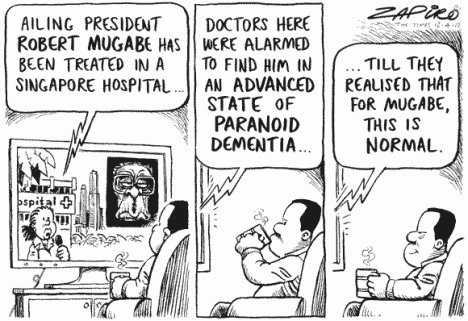Durban High Court Judge, Kate Pillay, ruled that the Chinese ship, An Yue Jiang, which is bearing 77 tons in arms destined for Zimbabwe, may not be off-loaded and that the arms may not be transported via South Africa. Soon after the judgement was made, the ship lifted anchor and left Durban harbour.
Considering the complete absence of an appeal and that Captain Sunaijun told the media that he was awaiting instruction from his ‘owner’, one cannot help bit assume that both the wily Chinese government and the desperate Mugabe government have some sort of a contingency plan in place.
Feasibility of a Contingency Plan
A contingency plan could involve setting sail to one of Zimbabwe’s only other two sea bordering neighbours: Mozambique and Tanzania. Tanzania is a ‘civil’ neighbour but not friendly enough to be prepared to handle this particular international political hotcake.
Considering this, Mozambique could prove to be the most feasible alternative.
Robert Mugabe and the Frelimo president of Mozambique, Armando Guebuza, have been firm friends since their freedom fighting days. They had shared enemies – the old Rhodesia, the old South Africa and the Imperialistic West – and shared friends – Cuba, communist USSR, North Korea and China.
It is reasonable to assume that Guebuza will probably be a little worried about repercussions (especially those appertaining to the substantial international grants the country is receiving), that could arise from transporting the arms through his country, but considering that he is highly unlikely to invoke his large South African neighbour’s political wrath, chances are really good that he will grant Mugabe the favour.
There are two ports in Zimbabwe that could potentially deal with the cargo: Maputo and Beira.
The challenge with using the larger, better equipped harbour of Maputo is that the cargo will still have to be transported by road to Beira before being loaded onto trains to Harare. The road between Maputo and Beira is not in a good condition, and there could also be some issues around finding enough trucks to get the job done.
Beira presents a far better option. Once the ship docks, the cargo could be transported by the Beira Railroad Corporation on the Machipanda line which runs through Malverna (Port of Entry between Mozambique and Zimbabwe) and which ends in Harare. The only other available railway line which runs from Beira, the Sena Line, will not be used, as it is not fully operational yet after it was partly destroyed by Renamo during the 80s.
Stopping the Shipment: What are the options?
The SALC: The SALC indicated that should the An Yue Jiang sail to Mozambique, they will seek remedy from the Mozambique courts. The challenge here is that the laws of that country may be insufficient in respect of matters such as these. There is also a very real chance that the courts could be influenced by Armando Guebuza not to grant such an application, even if the application could be granted under Mozambique law.
The Mbeki factor: As an influential economic partner of Mozambique, President Thabo Mbeki could exert diplomatic pressure on President Armando Guebuza not to allow the cargo to cross his soil. Considering that some of Mbeki’s cabinet members (Minister of Foreign Affairs, Minister of Defence, Secretary of Defence) were some of the respondents in the urgent High Court applications yesterday, and that he has done less than nothing to manage the entire debacle the chances of Mbeki intervention is close to non-existent.
International pressure: Mozambique is the beneficiary of World Bank and IMF funding – funds that the country simply cannot do without. Both institutions could use this reliance on funding to stop Mozambique from allowing the weapons to be transported through the country. The World Bank and the IMF may however feel that it is neither ethical nor appropriate to hold a sovereign country hostage in this way.
These three options are the only options available and none of them are great.
The best outcome will be if Mozambique – in view of international sentiment – had to offer China and Zimbabwe a polite, but firm “NAY!” Considering how quickly the ship rushed away, there is a really good chance that they may have already secured a polite and firm “AYE!” instead.
Filed under: Africa, arms, China, Election, Mbeki, mugabe, politics, Robert Mugabe, South Africa, Thabo Mbeki, weapons, Zimbabwe | Tagged: arms, China, Mbeki, Mozambique, mugabe, politics, Robert Mugabe, South Africa, Thabo Mbeki, weapons, Zimbabwe | Leave a comment »










